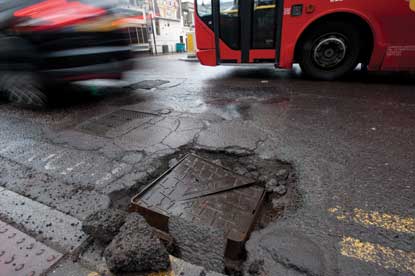By Richard Johnstone | 8 October 2012
Private companies should take over the maintenance and improvement of major roads in England to ‘overcome the funding gaps’ that are restricting improvements to the ‘creaking’ road network, the CBI has said.
 The business group is arguing that leasing roads to private companies through a ‘regulated asset base’ model could close a £10bn gap in capital projects proposed by the Highways Agency.
The business group is arguing that leasing roads to private companies through a ‘regulated asset base’ model could close a £10bn gap in capital projects proposed by the Highways Agency.
Today’s Bold thinking: a model to fund our future roads report said constrained public finances, along with declining revenue from motoring taxes due to more fuel-efficient vehicles, means the current system is ‘unsustainable’.
The current strategic road network, which is operated and maintained by the Highways Agency, should be extended to include some roads currently maintained by local authorities. This larger network would then be offered to private operators on a region-by-region basis by a new roads regulator, which would also monitor performance and improvements by the new firms.
The private operators would be paid a proportion of motoring taxes per user, set by the regulator according to regional needs. This could be used to pay for road improvements.
As well as allowing firms to invest in the network, increasing the number of providers in the road network would lead to greater innovation and efficiency, the report added.
A regulated model would address the problem of the Highways Agency’s budget being subject to annual revision, CBI director general John Cridland said.
Regulated asset base models are already used in the rail and water industry. In both, a regulator sets performance targets and capacity enhancements for operators to meet during a designated ‘control period’, usually five years, with charges also set for the period. In the water industry, this allows firms to borrow against the future income to invest in infrastructure, while in the rail sector it is intended to reduce costs.
The CBI said the model had ‘a track record in attracting private capital, regulating performance and controlling prices’. The water industry has received £98bn of private investment since the 1980s through this model, along with capped charges on customers.
Cridland said the road network needed for ‘a gear change in investment, performance and efficiency’. The UK economy is already losing up to £8bn each year from congestion on the roads, which could potentially rise to £22bn by 2025, he added.
‘Every day, people up and down the UK lose time and money because of our clogged-up roads – whether you’re a business waiting for an urgent delivery, or a commuter stuck in the morning rush-hour.
‘With public spending checked, the case for new funding solutions is even more compelling, and the government recognises this. Infrastructure matters to business, and delivering upgrades to our networks is one of the highest priorities for the CBI to get the economy moving again.’
The call follows Prime Minister David Cameron’s announcement in March that the government wanted private finance, including pension funds, to be used to upgrade and maintain major roads.
A feasibility study, undertaken by the Department for Transport and Treasury, is expected to report later this year.



Private companies should take over the maintenance and improvement of major roads in England to ‘overcome the funding gaps’ that are restricting improvements to the ‘creaking’ road network, the CBI has said.
 The business group is arguing that leasing roads to private companies through a ‘regulated asset base’ model could close a £10bn gap in capital projects proposed by the Highways Agency.
The business group is arguing that leasing roads to private companies through a ‘regulated asset base’ model could close a £10bn gap in capital projects proposed by the Highways Agency.Today’s Bold thinking: a model to fund our future roads report said constrained public finances, along with declining revenue from motoring taxes due to more fuel-efficient vehicles, means the current system is ‘unsustainable’.
The current strategic road network, which is operated and maintained by the Highways Agency, should be extended to include some roads currently maintained by local authorities. This larger network would then be offered to private operators on a region-by-region basis by a new roads regulator, which would also monitor performance and improvements by the new firms.
The private operators would be paid a proportion of motoring taxes per user, set by the regulator according to regional needs. This could be used to pay for road improvements.
As well as allowing firms to invest in the network, increasing the number of providers in the road network would lead to greater innovation and efficiency, the report added.
A regulated model would address the problem of the Highways Agency’s budget being subject to annual revision, CBI director general John Cridland said.
Regulated asset base models are already used in the rail and water industry. In both, a regulator sets performance targets and capacity enhancements for operators to meet during a designated ‘control period’, usually five years, with charges also set for the period. In the water industry, this allows firms to borrow against the future income to invest in infrastructure, while in the rail sector it is intended to reduce costs.
The CBI said the model had ‘a track record in attracting private capital, regulating performance and controlling prices’. The water industry has received £98bn of private investment since the 1980s through this model, along with capped charges on customers.
Cridland said the road network needed for ‘a gear change in investment, performance and efficiency’. The UK economy is already losing up to £8bn each year from congestion on the roads, which could potentially rise to £22bn by 2025, he added.
‘Every day, people up and down the UK lose time and money because of our clogged-up roads – whether you’re a business waiting for an urgent delivery, or a commuter stuck in the morning rush-hour.
‘With public spending checked, the case for new funding solutions is even more compelling, and the government recognises this. Infrastructure matters to business, and delivering upgrades to our networks is one of the highest priorities for the CBI to get the economy moving again.’
The call follows Prime Minister David Cameron’s announcement in March that the government wanted private finance, including pension funds, to be used to upgrade and maintain major roads.
A feasibility study, undertaken by the Department for Transport and Treasury, is expected to report later this year.




















